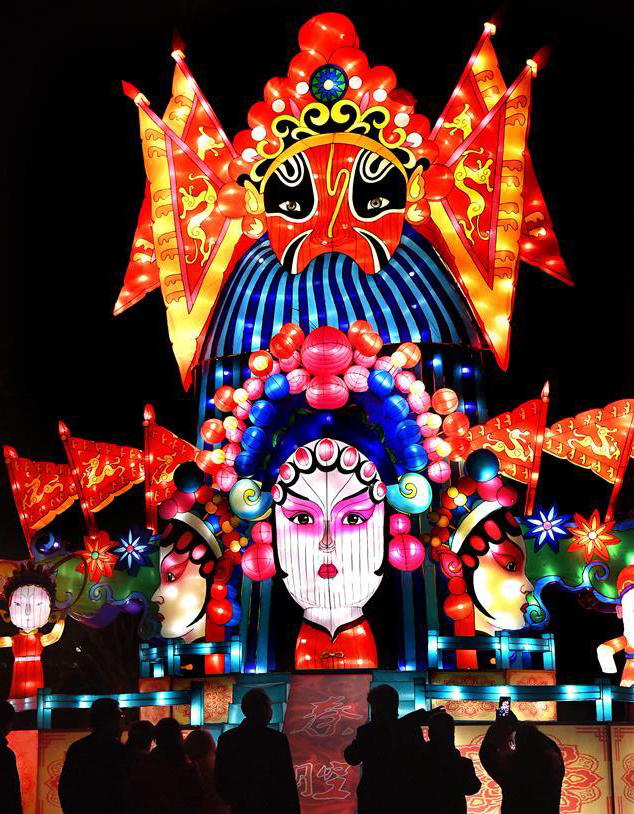Project to expand cultural exchanges, cooperation among nations along B&R

Citizens are visiting a piece of lantern work during the “Belt and Road” International Lantern Festival which runs from Jan. 21 to late May in the city of Han Cheng, Shaanxi Province.
The Project of Cultural Development Along the Routes of the “Belt and Road” Initiative 2016-2020 was recently approved. Proposed by the Ministry of Culture, it maps out a blueprint for deeper cultural exchanges and cooperation among countries along the routes.
“The ancient Silk Road primarily served cultural exchanges. Trade was actually a subordinate goal,” said Wang Yiwei, a professor from the School of International Relations at Renmin University of China.
The greatest achievement of cultural exchanges is the spread of civilization. The “Belt and Road” initiative emphasizes cooperation in five aspects: Governments should improve communication and seek common ground to reach policy consensus. To access more areas, transportation infrastructure is the focus while oil and gas pipelines and transmission networks are also necessary. Cooperation should be facilitated in terms of information exchanges, customs and certification to expand trade and investment. The Silk Road Fund, relevant counties and private capital can all participate in the fundraising. The spirit of the ancient Silk Road should be passed down. These are all related to cultural exchanges, Wang Yiwei added.
Wang Qiguo, a research fellow from the Institute for Cultural Industries at Peking University, said that people compare cultural exchanges to bridges and connections because they enable a spiritual conversation, thus eradicating prejudice and unhealthy mentalities. Also, cultural exchanges are the bedrock of successful implementation of the initiative, he said.
Cultural exchanges lay a solid public foundation for deeper bilateral and multilateral cooperation along the proposed routes of the “Belt and Road.” Political trust and economic cooperation between China and relevant countries will be promoted, said Xing Liju, an associate professor from the Institute of International Affairs at Fudan University.
Western countries have been skeptical about the initiative since the very start. It has been variously misread as the Chinese version of the Marshall Plan and neocolonialism. It is a necessary mission for China to counter the narrative of prejudice and misunderstanding, Xing said.
Wang Yiwei said that Western countries once dominated world civilization, and one-way dissemination of culture extended from the core to the marginal regions. However, the pattern is currently unraveling. The spirit of the Silk Road was put forward and acts as the guideline of the “Belt and Road” initiative. Central to this is a belief in the equality of all kinds of cultures, which will inspire them to exchange and creatively integrate with each other. The pattern of world civilization is becoming diverse.
The “Belt and Road” initiative provides opportunities and platforms for cultural exchanges and cooperative development among relevant countries and nations worldwide. Various measures can be adopted, such as years of cultural exchange and Chinese cultural festivals, mutual translation of books from other countries as well as setting up overseas Chinese cultural centers. Wang Qiguo said that the countries and regions along the proposed routes can better understand China and promote integration, which is at the top of the agenda of the “Belt and Road” initiative.
The project proposed five suggestions. Among them, the most crucial task is to optimize the construction of a cooperative mechanism for cultural exchanges, which is followed by the perfection of a related platform, Wang Qiguo said. Suggestions also call for efforts to build cultural brands, develop cultural industries, and promote cross-cultural trade and cooperation.
To achieve these goals, pilot projects of cultural exchanges are needed in which countries with a profound cultural basis can take the lead. New technologies can also be introduced to reproduce the splendid culture along the ancient Silk Road, said Wang Yiwei.
Pan Yuefei is a reporter at the Chinese Social Sceicnes Today.
